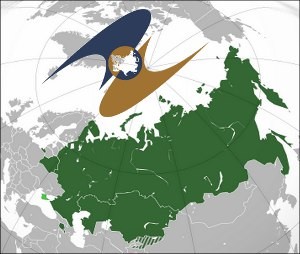BISHKEK (TCA) — In 2017, the economies of Eurasian Development Bank (EDB) member countries — Armenia, Belarus, Kazakhstan, Kyrgyzstan, Russia, and Tajikistan — adapted to negative external developments and embarked onto a trajectory of economic growth. The region’s task for the next several years is to achieve more reliable and higher economic development rates, according to the quarterly Macroeconomic Review published by the Chief Economist Group at the EDB.
The authors of the review note that the EDB countries have demonstrated positive growth rates due to improved external developments, the gradual softening of their monetary policies, and fiscal incentives. As at the end of 2017, the region’s GDP grew by 1.8%, compared to a decline of 0.1% in 2016. Mutual trade is recovering, too. In January-November 2017, trade between the Eurasian Economic Union’s (EEU) countries totaled US $48.8 billion, or 26.4% more than in the same period of the previous year.
EDB analysts forecast positive economic growth in the Bank’s member states and a 2.2% increase in the region’s GDPs in 2018. In Armenia GDP is expected to rise by 3%, Belarus 2.6%, Kazakhstan 3.7%, Kyrgyzstan 4.2%, Russia 2%, and Tajikistan 7.3%. The record-low inflation rate achieved in 2017 (an average of around 3% for the region) is forecast to increase to 4% in 2018 but will remain within the targets set by the central/national banks. In Armenia inflation is expected at a level of 3.4% (year-on-year in December), Belarus 6%, Kazakhstan 5.8%, Kyrgyzstan 4.7%, Russia 3.8%, and Tajikistan 6.1%.
“An efficient application of fiscal rules should help to lessen the nominal exchange rate’s dependence on oil prices in the region’s leading economies and stabilise mutual exchange rates of the EDB member countries,” Yaroslav Lissovolik, Chief Economist at the EDB, comments.
A special report attached to The Macroeconomic Review describes mutual trade between the EEU countries, pointing out to increases in its nominal volumes, greater diversification of its structure, and a lower percentage of transactions in mineral resources in overall trade volumes. According to the authors, all these trends suggest that the single market in goods and services within the EEU begins to bring economic dividends.
The Eurasian Development Bank (EDB) is an international financial institution founded by Russia and Kazakhstan in January 2006 with the mission to facilitate the development of market economies, sustainable economic growth, and the expansion of mutual trade and other economic ties in its member states. The EDB’s charter capital totals US $7 billion. The member states of the Bank are Armenia, Belarus, Kazakhstan, Kyrgyzstan, Russia, and Tajikistan.



